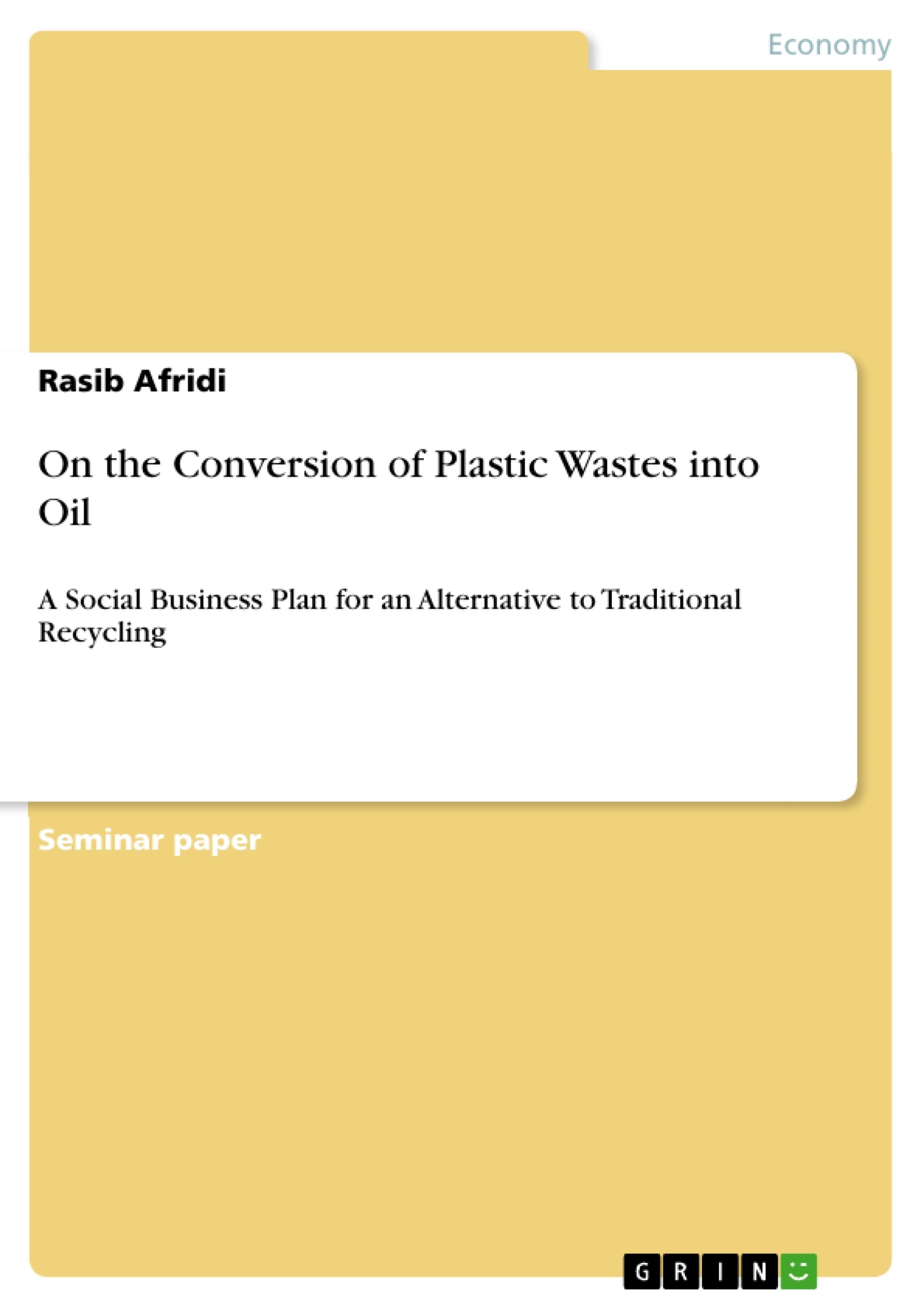This work analyzes an alternative to traditional recycling. It focuses on the conversion of plastics, a non-biodegradable material.
There is a huge amount of plastic wastes lying around and no systematic process present in order to recycle them. The primary reason why the rising pile of plastic is concerning for Bangladesh is its 'Non-Biodegradability'. When being thrown on land, it destroys the fertility of the soil. Similarly, for the same reason, it is harming the sea, river and oceans‘ lives when thrown on it. Through this business plan, I want to bring insight to an alternative energy production mean, that is the plastic waste to crude oil conversion. With superior efficiency level, industrial waste will also reduce by a huge extent as plastic waste constitutes most of these wastes.
Plastic is a non-biodegradable product, which means it cannot be dumped into the ground. Plastic recycling has now become a very key element to protect the nature. Whether in Asia or in Europe, a number of countries are involved in plastic waste recycling. However, that is not quite observed in our country. As a result of which, the pile of plastic is perpetually rising. With superior efficiency level, industrial waste will also be reduced by a huge extent as plastic waste constitutes most of these wastes. Plastic pollution is an ever-concerning issue. We should not only look for steps to reduce it, but also to re-use the ones that are being wasted. Through this social business plan, the primary goal is to help reduce industrial wastes by a large extent. The need for crude oil is massive for most industries. If plastic wastes generated in those industries and factories were in fact converted into oil, that would reduce the operational expenses by a sharp margin and, more importantly, will reduce a big chunk of their waste.
Inhaltsverzeichnis (Table of Contents)
- Introduction
- Background
- Objectives
- Nailing the Vision
- The problem and the opportunity
- Mission
- Tying the vision to action
- The Solution:
- Power Generation Using Fast Pyrolysis Liquids
- Leadership: Team and Board
- Financials
- Measurement and evaluation
- Messaging/communications
- Marketing & Market Competition
- Human Psychology / Acceptance
- Ecosystem
- Competitive Analysis:
- Risks
- Unauthorized Waste Collection
- Adoption of other means than Pyrolysis
- Technology for Conversion
- Stable End Product Quality Related
- Government Policies and Support
- PESTEL Analysis
- Scaling strategy
- Sell as Furnace fuel (Furnace oil)
- Sell as fuel (like diesel)
- Convert & sell as Electrical Energy
- Captive Power plant with converted Fuel
- Project Timeline
Zielsetzung und Themenschwerpunkte (Objectives and Key Themes)
This business plan aims to introduce a sustainable solution for plastic waste management in Bangladesh by converting plastic waste into crude oil through the process of anhydrous pyrolysis. This process holds significant potential for reducing environmental pollution, creating a reliable energy source, and boosting the local economy.
- Plastic waste management and environmental sustainability
- Alternative energy production and resource utilization
- Economic development and investment opportunities
- Technological innovation and the adoption of pyrolysis technology
- Market analysis and competitive landscape
Zusammenfassung der Kapitel (Chapter Summaries)
The business plan begins by outlining the problem of plastic waste accumulation in Bangladesh and its detrimental effects on the environment. The authors emphasize the need for a sustainable solution and introduce the concept of plastic waste to crude oil conversion through anhydrous pyrolysis. The plan then details the technology behind this process and the team responsible for implementing it. Key financial considerations are outlined, including project costs, revenue streams, and expected return on investment. The plan further delves into marketing strategies, competitive analysis, and potential risks associated with the project.
The plan addresses various challenges, including unauthorized waste collection, technology limitations, and government regulations. A detailed scaling strategy is proposed, focusing on different sales channels for the converted fuel and potential for a captive power plant. Finally, a comprehensive project timeline and financial projections are presented.
Schlüsselwörter (Keywords)
The primary keywords and focus topics of the text are plastic waste management, anhydrous pyrolysis, alternative energy, sustainable development, Bangladesh, economic development, investment opportunities, market analysis, competitive analysis, and risk assessment.
- Quote paper
- Rasib Afridi (Author), 2018, On the Conversion of Plastic Wastes into Oil, Munich, GRIN Verlag, https://www.grin.com/document/445728




